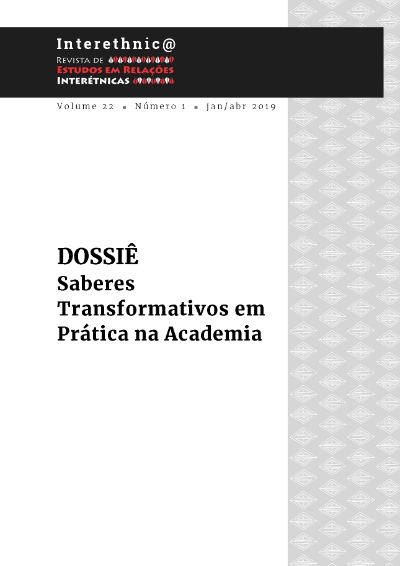MESPT and the counter-colonisation of University
Epistemic territories in dispute
DOI:
https://doi.org/10.26512/interethnica.v22i1.15263Keywords:
intercultural education, post-graduate education, diversityAbstract
The present paper intends to reflect on the academia as a place for social transformation. It shares the experience of eight MESPT students, interviewed during their course. The criteria for choosing the interviewees was to become as close as possible to the social and demographic composition of the whole classroom, base on ethnicity and gender. As a result, here are registered the speeches of indigenous students, quilombolas, gipsies, fisherwomen and men and afro-religious representatives. The interviews are semi-structured and the speech analysis was based on the concept of counter-colonization as developed by Antônio Bispo dos Santos (2015), as well as on the reflections on the motivations to enter higher education presented by Luciano (2011) and Sotto (2017). The paper concludes that the access to politically relevant positions and the epistemic confrontation with academia are the main motivations for these students to join the program.
Downloads
Downloads
Published
How to Cite
Issue
Section
License
COPYRIGHT AND EXCLUSIVITY
At the time of submission, authors undertake not to send this manuscript to another journal during the reviewing process. Conversely, the Journal does not accept articles that are still under review in other journals. Neither will it accept two simultaneous reviews of the same author, understanding that this constitutes simultaneity.
Submission automatically implies full assignment of the copyright, including translation, if the article is approved for publication. Authors may reproduce their articles, provided that the original source (Interethnic Journal) is cited
GOOD SCIENTIFIC PRACTICES
TAll submitted articles will be submitted to plagiarism and "self-plagiarism" or republishing (publication as unpublished material of texts already published). Eventual cases of bad practice will be examined and decided by the editorial committee according to the guidelines of the National Council for Scientific and Technological Development (CNPQ).
The integrity of the content of the articles is the sole responsibility of the authors.



